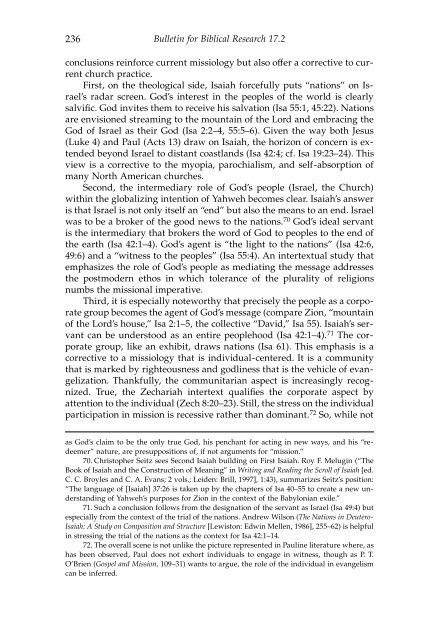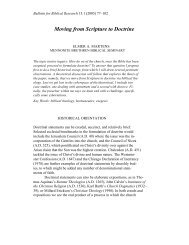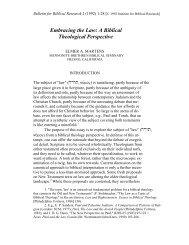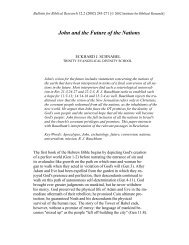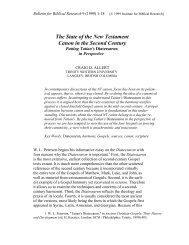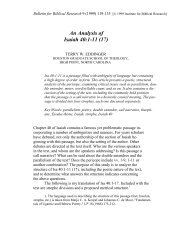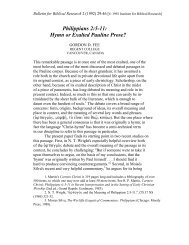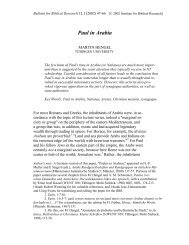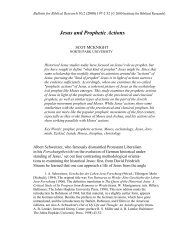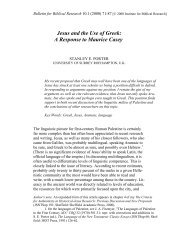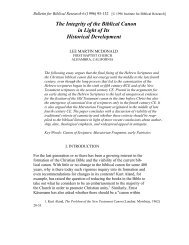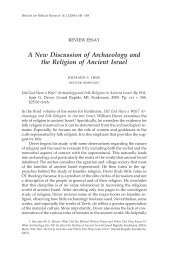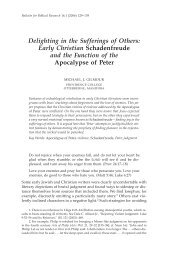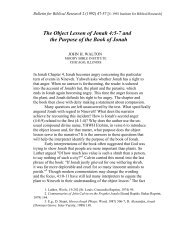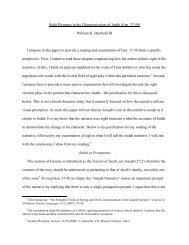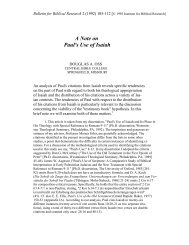Impulses to Mission in Isaiah - Institute for Biblical Research
Impulses to Mission in Isaiah - Institute for Biblical Research
Impulses to Mission in Isaiah - Institute for Biblical Research
You also want an ePaper? Increase the reach of your titles
YUMPU automatically turns print PDFs into web optimized ePapers that Google loves.
236<br />
Bullet<strong>in</strong> <strong>for</strong> <strong>Biblical</strong> <strong>Research</strong> 17.2<br />
conclusions re<strong>in</strong><strong>for</strong>ce current missiology but also offer a corrective <strong>to</strong> current<br />
church practice.<br />
First, on the theological side, <strong>Isaiah</strong> <strong>for</strong>cefully puts “nations” on Israel’s<br />
radar screen. God’s <strong>in</strong>terest <strong>in</strong> the peoples of the world is clearly<br />
salvific. God <strong>in</strong>vites them <strong>to</strong> receive his salvation (Isa 55:1, 45:22). Nations<br />
are envisioned stream<strong>in</strong>g <strong>to</strong> the mounta<strong>in</strong> of the Lord and embrac<strong>in</strong>g the<br />
God of Israel as their God (Isa 2:2–4, 55:5–6). Given the way both Jesus<br />
(Luke 4) and Paul (Acts 13) draw on <strong>Isaiah</strong>, the horizon of concern is extended<br />
beyond Israel <strong>to</strong> distant coastlands (Isa 42:4; cf. Isa 19:23–24). This<br />
view is a corrective <strong>to</strong> the myopia, parochialism, and self-absorption of<br />
many North American churches.<br />
Second, the <strong>in</strong>termediary role of God’s people (Israel, the Church)<br />
with<strong>in</strong> the globaliz<strong>in</strong>g <strong>in</strong>tention of Yahweh becomes clear. <strong>Isaiah</strong>’s answer<br />
is that Israel is not only itself an “end” but also the means <strong>to</strong> an end. Israel<br />
was <strong>to</strong> be a broker of the good news <strong>to</strong> the nations. 70 God’s ideal servant<br />
is the <strong>in</strong>termediary that brokers the word of God <strong>to</strong> peoples <strong>to</strong> the end of<br />
the earth (Isa 42:1–4). God’s agent is “the light <strong>to</strong> the nations” (Isa 42:6,<br />
49:6) and a “witness <strong>to</strong> the peoples” (Isa 55:4). An <strong>in</strong>tertextual study that<br />
emphasizes the role of God’s people as mediat<strong>in</strong>g the message addresses<br />
the postmodern ethos <strong>in</strong> which <strong>to</strong>lerance of the plurality of religions<br />
numbs the missional imperative.<br />
Third, it is especially noteworthy that precisely the people as a corporate<br />
group becomes the agent of God’s message (compare Zion, “mounta<strong>in</strong><br />
of the Lord’s house,” Isa 2:1–5, the collective “David,” Isa 55). <strong>Isaiah</strong>’s servant<br />
can be unders<strong>to</strong>od as an entire peoplehood (Isa 42:1–4). 71 The corporate<br />
group, like an exhibit, draws nations (Isa 61). This emphasis is a<br />
corrective <strong>to</strong> a missiology that is <strong>in</strong>dividual-centered. It is a community<br />
that is marked by righteousness and godl<strong>in</strong>ess that is the vehicle of evangelization.<br />
Thankfully, the communitarian aspect is <strong>in</strong>creas<strong>in</strong>gly recognized.<br />
True, the Zechariah <strong>in</strong>tertext qualifies the corporate aspect by<br />
attention <strong>to</strong> the <strong>in</strong>dividual (Zech 8:20–23). Still, the stress on the <strong>in</strong>dividual<br />
participation <strong>in</strong> mission is recessive rather than dom<strong>in</strong>ant. 72 So, while not<br />
as God’s claim <strong>to</strong> be the only true God, his penchant <strong>for</strong> act<strong>in</strong>g <strong>in</strong> new ways, and his “redeemer”<br />
nature, are presuppositions of, if not arguments <strong>for</strong> “mission.”<br />
70. Chris<strong>to</strong>pher Seitz sees Second <strong>Isaiah</strong> build<strong>in</strong>g on First <strong>Isaiah</strong>. Roy F. Melug<strong>in</strong> (“The<br />
Book of <strong>Isaiah</strong> and the Construction of Mean<strong>in</strong>g” <strong>in</strong> Writ<strong>in</strong>g and Read<strong>in</strong>g the Scroll of <strong>Isaiah</strong> [ed.<br />
C. C. Broyles and C. A. Evans; 2 vols.; Leiden: Brill, 1997], 1:43), summarizes Seitz’s position:<br />
“The language of [<strong>Isaiah</strong>] 37:26 is taken up by the chapters of Isa 40–55 <strong>to</strong> create a new understand<strong>in</strong>g<br />
of Yahweh’s purposes <strong>for</strong> Zion <strong>in</strong> the context of the Babylonian exile.”<br />
71. Such a conclusion follows from the designation of the servant as Israel (Isa 49:4) but<br />
especially from the context of the trial of the nations. Andrew Wilson (The Nations <strong>in</strong> Deutero-<br />
<strong>Isaiah</strong>: A Study on Composition and Structure [Lewis<strong>to</strong>n: Edw<strong>in</strong> Mellen, 1986], 255–62) is helpful<br />
<strong>in</strong> stress<strong>in</strong>g the trial of the nations as the context <strong>for</strong> Isa 42:1–14.<br />
72. The overall scene is not unlike the picture represented <strong>in</strong> Paul<strong>in</strong>e literature where, as<br />
has been observed, Paul does not exhort <strong>in</strong>dividuals <strong>to</strong> engage <strong>in</strong> witness, though as P. T.<br />
O’Brien (Gospel and <strong>Mission</strong>, 109–31) wants <strong>to</strong> argue, the role of the <strong>in</strong>dividual <strong>in</strong> evangelism<br />
can be <strong>in</strong>ferred.


